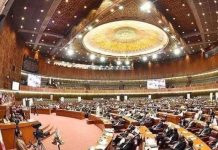LAHORE, FEB 9 /DNA/ – The Pakistan-Romania Business Council (PRBC) and the Sri Lanka Pakistan Business Forum (SPBF) have signed a Memorandum of Understanding (MoU) to promote trade, investment, and economic cooperation between Pakistan, Romania, and Sri Lanka.
The MoU was signed by Mr. Yasin Joiya, Honorary Consul of Sri Lanka in Lahore, and Mr. Sohail Shamim Firpo, Chairman of PRBC. This significant agreement aims to foster greater economic ties and mutual benefits for all three nations.
Atif Farooqi, Advisor and Chief Operating Officer of PRBC, stated, “This partnership will serve as a catalyst for fostering economic cooperation between Romania and Sri Lanka, leveraging Pakistan’s strategic location as a bridge between the two nations. We envision this collaboration to unlock new opportunities for trade, investment, and growth, ultimately strengthening regional economic ties.
Beekeeping becomes a lucrative business in rural areas
By Fakhar-e-Alam
PESHAWAR, Feb 09 (APP):Fixing steel-nail in wooden bee-boxes under a bare tree on a bank of River Kabul, Hussain Khan — a progressive beekeeper is making determined efforts to prepare it before an onset of spring season.
As the sun rays bath the house of 35-year-old beekeeper, Hussain Khan start his Alto Car to reach his farmhouse constructed at Pashtoon Ghari village in Nowshera district where he along with co-beekeepers began fixing steel-nail in order to prepare 500 bee-boxes to take advantage of blossom of bee-flora plants and flowers buds.
“Following the untimely death of my parents, life was a nightmare for me as my relatives were pressing for huge amount borrowed for treatment of my Abu and Ammi, forcing me to leave my education incomplete and joined the pain-sticking beekeeping business,” said Hussain with sobbing eyes while talking to APP.
“Initially, I purchased 50 bee-boxes in 2020 and by the grace of Allah Almighty, it increased to 500 boxes within four years due to my hard work and commitment to the job, enabling me to return all the borrowed amount as well as established a beekeeping farm house here,” he said.
Hussain said that beekeeping was a cost-efficient profession and any person making Rs 500,000 investment can earn upto Rs100,000 per month.
Employing two laborers, Hussain was planning to go to Punjab and Azad Kashmir where an abundance of bee-flora plants was planted under the Prime Minister’s Green Pakistan Program.
He urged the Khyber Pakhtunkhwa government to focus on plantations of native species like palosa, bair and shisham, provide interest free loans to beekeepers and fix honey selling rates.
Sher Zaman, General Secretary of All Pakistan Beekeepers Association, said Pakistan’s biodiversity and climate conditions are most suited for beekeeping business that needed the government patronage to arrest the unemployment.
More than 700 plants, mostly bees-flora, are found in Punjab, Sindh, Khyber Pakhtunkhwa, Balochistan, AJK and Gilgit Baltistan, attracting millions of indigenous and exotic honey bees every year.
The rural areas of Chakwal, Mianwali, Gujarkhan, Attock, Sargodha, uska, Rawalpindi, Jehlum, Pathoki, in Punjab, Karak, Kohat, Swat, DI Khan, Chitral, Peshawar, Nowshera, Charsadda, Bannu, Hazara, Malakand, Turbela, Haripur in KP, Quetta, Ziarat, Naseerabad, Kalat in Balochistan and Thatta, Sujawal, Mirpur Khas and Hyderabad in Sindh are most suited for beekeeping business.
“Our exports especially of the bair and phulai honey increased to Saudi Arabia, UAE, Kuwait, Oman, Yeman, Iraq, Qatar, Libya, Afghanistan, Maleysia, USA, China, Singapore, Azerbaijan, Mangolia etc due it’s better taste and quality and called for better marketing to increase honey exports,” he said.
He urged an issuance of cards to beekeepers for identification while migrating from one district/province to another to avoid times, and bees loss during check-post.
KP government urged to impose a ban on cutting of berry and palosa trees and award strict punishment to timber mafia to save thousands of bees from extinction.
Iftikhar Khalil, former Director Apiculture/NTFP said Pakistan was a home to four famous honey bees including Apis Cerana (small bee), Apis Dorsata (wild bee), Apis Flori (little bee) and exotic Apis Mellifera having over 450,000 colonies with capacity to produce 12,000 metric ton honey per year.
Mellifera produces 20 to 25 kg honey per colony (box) against six to eight kilogram by native bees two times in a year. Apis Dorsata has the ability to produce 40 to 45 kg honey from each hive mostly in tall trees and buildings, adding around 120,000 to 150,000 wild bees were busy in a one meter-length and half-meter wide comb making 120 degree angle.
Iftikhar said, “two queens in the same colony cannot live together as the younger queen often kills the elder or the latter leaves the colony in fear of sharing food.”
“Bees collect pollen and nectar within five-kilometer radius of hives and majority prefer to get food while staying close to their combs,” he said, adding one bee produces 1/12th of a teaspoon of honey in her life time and flapping their wings 11,000 times per minute beside using her tiny hairs to take pollen and stomach to carry 70mg nectar.
However, he said there is every possibility of losing an average of five to ten kg out of 1000 kilogram of honey production if preventive measures were not taken.
“Wild bees are under heightened danger due to deforestation and climate change weather patterns and if proper attention was not given to their preservation and management of natural forests their population would vanish in a few decades.”
He stressed the need for capacity building of beekeepers to face any situation like rising of food and nurseries of bee-flora plants.
Admitting climate change’s effects on the population of Apis Flori and Apis Dorsata commonly known as “Swat bees”, he said Apis mellifera was imported from Australia in 1977 owing to her speedy growth and increased power of honey production.
Research project was launched at Agriculture Research Institute Tarnab, Peshawar, Faisalabad and National Agriculture Research Centre Islamabad in 1979 to analyze mellifera’s properties. Iftikhar said Apis mellifera was mostly vulnerable to bacteria attacks such as American and European foul brood diseases, which often causes substantial losses to beekeepers if not treated.
He said about Rs 43 billion revenues could be generated and over 100,000 new jobs to be created after achieving the 70,000MT honey target, adding 10,009 exotic bees has a potential of producing 100 tons honey per year with financial benefits of Rs75 million.
Annually, 10 tons of honey can be produced from indigenous bees with annual economic benefits of Rs38 million and collectively Rs113 million income from the beekeeping sector.
Iftikhar said KP southern districts are most suited for beekeeping business where about 5.2 million bair trees could be planted in Karak, Kohat, Bannu, Lakki Marwat, Tank and DI Khan.
He said that 15000 beekeepers and farmers would be trained under National Apiculture Up-scaling Program for Income and Rural Employment (ASPIRE) in the country including Khyber Pakthunkhwa.
Under ASPIRE, he said the training and capacity building of these beekeepers and their certification would be achieved through National Vocational and Technical Training Commission (NAVTTC).
Dr Naeem Khattak, former Chairman Economics Department said that beekeeping was an effective business to combat unemployment in Pakistan.
As per Economic Survey of Pakistan 2023-24 report, he said about 4.5 million individuals are unemployed in the country, with the youth aged 15-24 having the highest unemployment rate of 11.1 per cent and this social problem could be addressed by promoting beekeeping.
He stressed the need for a national apiculture policy, establishment of high standards for bee products and equipment besides promotion of beekeeping as a productive business operation and important component of forests and agricultural ecosystem to compete at international level.
Introduction of a national bee breeding program would help meet local demands for good quality queens and efforts should be made to promote commercial beekeeping, apiculture products and services.
Musawar Khan, adviser to the Chief Minister KP for forests said that bees are the lifeline of Pakistan and preference was being given to bees-favorite species in spring and monsoon plantations to make KP a land of honey.
The capacity of beekeepers through extensive training by NTFP experts would be enhanced. He said thousands of bees’ boxes have been distributed among flood affected beekeepers and farmers in Khyber Pakthunkhwa.
He said a new type of honey “Margalla” was introduced, mostly useful for asthma and allergy patients while “Ber and Kalongi” honey was also brought in markets keeping in view of its numerous health benefits for consumers.












